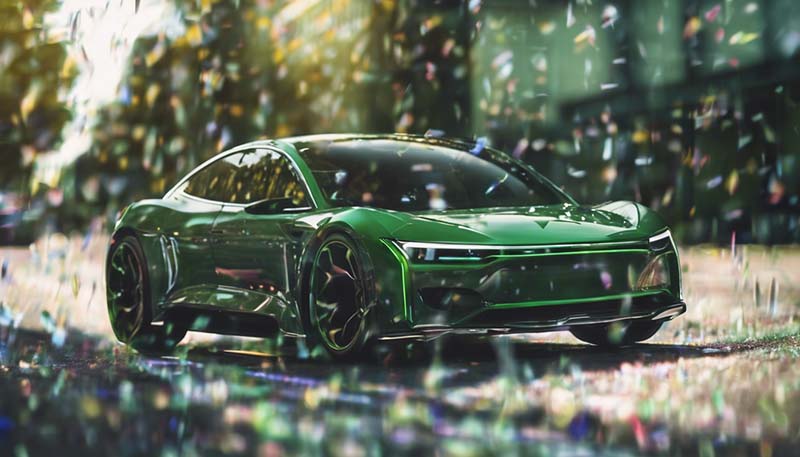Introduction
The automotive industry is undergoing a significant transformation as the world shifts towards sustainable and environmentally friendly transportation solutions. The race for green technology has led to the rapid development and adoption of electric vehicles (EVs). As manufacturers compete to innovate and capture market share, they are introducing advanced technology features that are reshaping the driving experience. In this article, we will explore and compare the tech features of some of the leading electric car models on the market today.
Battery Technology
The heart of any electric vehicle is its battery. The range, performance, and longevity of an EV are largely determined by the battery technology it employs. Here's a comparison of battery tech features in some popular electric car models:
Tesla Model S
Tesla's Model S is renowned for its high-capacity battery pack, which provides an impressive range. Tesla's proprietary battery technology uses thousands of smaller lithium-ion cells arranged in a unique configuration to maximize energy density and safety. The Model S also benefits from Tesla's extensive Supercharger network, which allows for fast charging times.
Advertisement
Nissan Leaf
The Nissan Leaf, a more budget-friendly option, uses a smaller lithium-ion battery pack that offers a shorter range compared to Tesla's vehicles. However, the Leaf is praised for its energy-efficient design and the availability of home charging solutions, making it a popular choice for urban commuters.
Chevrolet Bolt
The Chevrolet Bolt boasts a high-capacity battery pack similar to Tesla's offerings, allowing for a substantial range on a single charge. The Bolt's battery technology includes advanced thermal management systems to ensure optimal performance in various weather conditions.
Charging Infrastructure
The availability and convenience of charging infrastructure play a crucial role in the adoption of electric vehicles. Here's how different models fare in terms of charging tech features:
Tesla Model S
Tesla has built an extensive Supercharger network that provides fast and convenient charging for its customers. Model S owners can expect to charge their vehicles to about 80% in as little as 40 minutes. Tesla also offers home charging solutions and destination chargers at popular locations like hotels and restaurants.
Nissan Leaf
The Leaf can be charged using a standard home outlet, making it easy for owners to charge overnight. Nissan also provides a home charging unit called the Nissan Energy Home, which can be installed for faster charging times. However, the availability of public charging stations for the Leaf is more limited compared to Tesla's network.
Chevrolet Bolt
The Bolt can be charged using a Level 2 home charging unit, which significantly reduces charging times compared to a standard outlet. For public charging, the Bolt is compatible with the ChargePoint and Electrify America networks, offering a growing number of fast-charging options across the United States.
Autonomous and Driver-Assist Features
Electric vehicles are often at the forefront of autonomous driving and driver-assist technology. Here's a look at some of the advanced features offered by leading EV models:
Tesla Model S
Tesla's Autopilot system is one of the most advanced driver-assist systems on the market. It includes features like adaptive cruise control, lane-keeping assist, and self-parking. Tesla is also working on full self-driving capabilities, which are expected to be rolled out in future software updates.

Nissan Leaf
The Leaf comes equipped with Nissan's ProPILOT Assist, which offers semi-autonomous driving capabilities. It includes features like adaptive cruise control, lane-keeping assist, and traffic jam assist, which can help reduce driver fatigue on long trips.
Chevrolet Bolt
The Bolt features Chevrolet's Safety Assist technologies, which include lane-keep assist with lane departure warning, forward-collision alert, and automatic emergency braking. While not as advanced as Tesla's Autopilot, these features still provide a level of autonomous driving support for Bolt drivers.
Infotainment and Connectivity
Modern electric vehicles are increasingly focused on providing a connected and interactive driving experience. Here's how some models stack up in terms of infotainment and connectivity features:
Tesla Model S
Tesla's Model S features a massive 17-inch touchscreen display that controls nearly all of the car's functions. The vehicle's infotainment system includes navigation, internet browsing, and media streaming capabilities. Tesla's over-the-air software updates also allow for continuous improvements and new features to be added to the system.
Nissan Leaf
The Leaf comes with a 7-inch touchscreen infotainment system that supports Apple CarPlay and Android Auto. It offers a range of connectivity features, including navigation, music streaming, and voice recognition capabilities.
Chevrolet Bolt
The Bolt features Chevrolet's MyLink infotainment system, which includes a 10.2-inch touchscreen display. It supports Apple CarPlay and Android Auto, offering seamless smartphone integration and access to various apps and services.
Conclusion
As the green tech race continues to accelerate, electric vehicles are becoming more advanced and feature-rich. Battery technology, charging infrastructure, autonomous and driver-assist features, and infotainment systems are all areas where manufacturers are pushing the envelope to deliver better driving experiences. Whether you're a Tesla enthusiast, a Nissan commuter, or a Chevrolet fan, there's an electric vehicle out there with the tech features to suit your needs and contribute to a greener future.
Comment Box